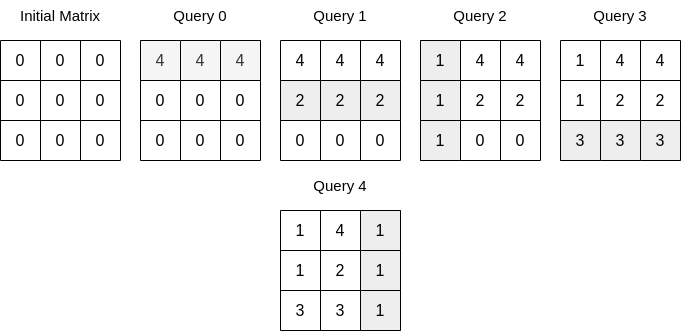2718. Sum of Matrix After Queries
Description
You are given an integer n and a 0-indexed 2D array queries where queries[i] = [typei, indexi, vali].
Initially, there is a 0-indexed n x n matrix filled with 0's. For each query, you must apply one of the following changes:
- if
typei == 0, set the values in the row withindexitovali, overwriting any previous values. - if
typei == 1, set the values in the column withindexitovali, overwriting any previous values.
Return the sum of integers in the matrix after all queries are applied.
Example 1:
Input: n = 3, queries = [[0,0,1],[1,2,2],[0,2,3],[1,0,4]] Output: 23 Explanation: The image above describes the matrix after each query. The sum of the matrix after all queries are applied is 23.
Example 2:
Input: n = 3, queries = [[0,0,4],[0,1,2],[1,0,1],[0,2,3],[1,2,1]] Output: 17 Explanation: The image above describes the matrix after each query. The sum of the matrix after all queries are applied is 17.
Constraints:
1 <= n <= 1041 <= queries.length <= 5 * 104queries[i].length == 30 <= typei <= 10 <= indexi < n0 <= vali <= 105
Solutions
Solution 1: Hash Table
Since the value of each row and column depends on the last modification, we can traverse all queries in reverse order and use hash tables $row$ and $col$ to record which rows and columns have been modified.
For each query $(t, i, v)$:
- If $t = 0$, we check whether the $i$th row has been modified. If not, we add $v \times (n - |col|)$ to the answer, where $|col|$ represents the size of $col$, and then add $i$ to $row$.
- If $t = 1$, we check whether the $i$th column has been modified. If not, we add $v \times (n - |row|)$ to the answer, where $|row|$ represents the size of $row$, and then add $i$ to $col$.
Finally, return the answer.
The time complexity is $O(m)$, and the space complexity is $O(n)$. Here, $m$ represents the number of queries.
1 2 3 4 5 6 7 8 9 10 11 12 13 14 15 | |
1 2 3 4 5 6 7 8 9 10 11 12 13 14 15 16 17 18 19 20 21 22 | |
1 2 3 4 5 6 7 8 9 10 11 12 13 14 15 16 17 18 19 20 21 22 23 | |
1 2 3 4 5 6 7 8 9 10 11 12 13 14 15 16 17 18 19 | |
1 2 3 4 5 6 7 8 9 10 11 12 13 14 15 16 17 18 19 20 | |




